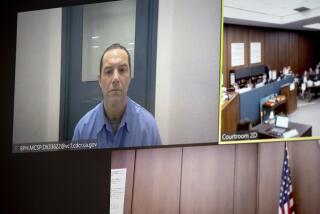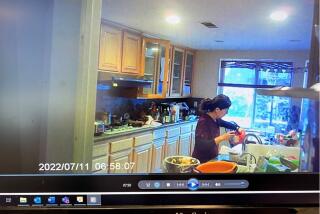DNA Evidence Will Be Permitted in Peng Murder Trial
- Share via
SANTA ANA — An Orange County Superior Court judge ruled Friday that crucial DNA evidence will be allowed in the murder trial of a woman accused of killing her husband’s lover and her infant son.
Li-Yun (Lisa) Peng, 44, of Rancho Santa Margarita is charged in the stabbing death of Ranbing (Jennifer) Ji and the death of Ji’s 5-month-old son, Kevin.
Prosecutors said that DNA evidence is important to the trial because it links Peng’s saliva to a bite mark on Ji’s left arm. Peng, who was not in court Friday, has pleaded innocent to both murder charges.
“It establishes she was in the apartment,” Deputy District Atty. Dennis Bauer commented after the decision. “I am very happy with the ruling. I have a very firm belief . . . about the admissibility and strength of this evidence.”
Defense attorney Marshall M. Schulman disagreed with Judge Kathleen E. O’Leary’s decision, insisting that DNA evidence is not reliable.
“It’s all estimation and assumption,” he said.
Prosecutors contend that Peng stabbed Ji 18 times in Ji’s Mission Viejo apartment on Aug. 18, 1993, because she was jealous of the woman’s relationship with Peng’s husband, Tseng (Jim) Peng, 52.
They also charged her with killing Ji’s son, Kevin, who was found suffocated in his crib in an adjoining room. Tseng Peng has testified that he was the baby’s father.
The DNA evidence in the Peng case shows that saliva from the bite mark on Ji’s arm matches genetic markers of samples taken from Peng. According to early estimates, such a match can only be found in one person out of 2 million, prosecutors have said.
Further analysis will probably put the figure closer to one in several hundred million, Bauer said Friday.
DNA, or deoxyribonucleic acid, is the basic material of life and contains an individual’s genetic code.
O’Leary said she concluded from expert testimony and articles presented during a hearing on the matter this month that DNA evidence has been generally accepted by the scientific community and that authorities collected the evidence in the Peng case properly.
O’Leary imposed two restrictions on the use of the evidence--that prosecutors use a conservative method of calculating the probability of the match and that they not use the term genetic “fingerprinting” when referring to the DNA evidence. The term could mislead a jury into believing that the evidence points to an absolute match instead of a statistical likelihood, she said.
DNA evidence has been admitted in Superior Court trials for the past several years, prosecutors say.
Tseng Peng is chief executive officer of San Diego-based Ranger Communications, one of the world’s largest manufacturers of citizens’ band radios with factories in Taiwan, Malaysia and China.
He testified during a court hearing last year that he had met Ji in 1990 while on a business trip to China. Ji became his executive secretary and later moved to Mission Viejo near the Pengs’ home. He said he discovered the bodies of Ji and her infant when he went to visit them.
More to Read
Sign up for Essential California
The most important California stories and recommendations in your inbox every morning.
You may occasionally receive promotional content from the Los Angeles Times.










